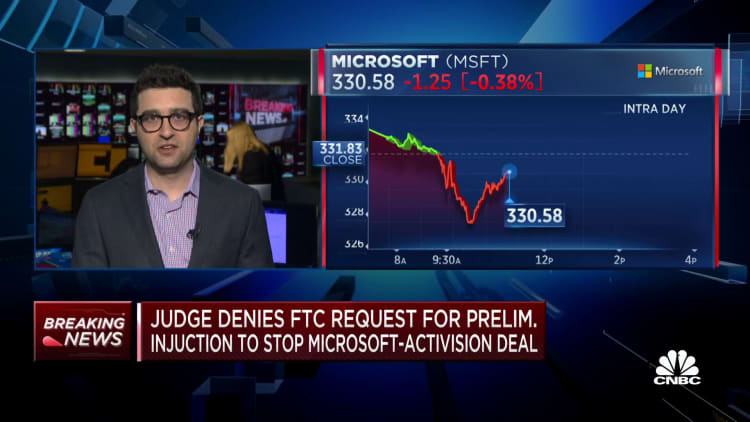
FTC Chair Lina Khan testifies during the House Energy and Commerce Subcommittee on Innovation, Data and Commerce hearing titled Oversight of the Securities and Exchange Commission, in Rayburn Building, April 18, 2023.
Tom Williams | Cq-roll Call, Inc. | Getty Images
When a federal judge on Tuesday decided to reject the Federal Trade Commission’s request for a preliminary injunction to prevent Microsoft from completing its acquisition of Activision Blizzard, she also rejected FTC Chair Lina Khan’s vision of antitrust enforcement.
While the judge’s ruling doesn’t mean the deal is totally in the clear, since the FTC can appeal and the U.K.’s competition enforcer has also opposed the deal, it’s indicative of the existential challenge Khan’s enforcement strategy faces in the courts.
Fighting the $68.7 billion deal has been one of the FTC’s biggest swings yet under Khan, who President Joe Biden named chair in 2021. Khan first emerged in antitrust circles for her critiques of how antitrust enforcement overlooked potential abuses by Amazon.
But even as many in Congress have become more open to a different view of antitrust in the digital age, the courts still pose a major hurdle to newer theories about how online companies can amass and leverage power to stifle rivals.
Judge Jacqueline Scott Corley wrote that the FTC had not shown it was likely to prevail in its administrative challenge of the merger in its internal proceeding, based on the agency’s view that the deal is likely to substantially lessen competition. The FTC has argued that Microsoft might make some of its games exclusive to its own game consoles or diminish the experience of Activision games on rival services should the deal close. Microsoft has said it would instead make the games more widely available.
Corley agreed with Microsoft’s view.
“To the contrary, the record evidence points to more consumer access to Call of Duty and other Activision content,” she wrote.
She added that, “Despite the completion of extensive discovery in the FTC administrative proceeding, including production of nearly 1 million documents and 30 depositions, the FTC has not identified a single document which contradicts Microsoft’s publicly-stated commitment to make Call of Duty available on PlayStation (and Nintendo Switch).”
The ruling means the parties are closer to being able to complete their merger by their July 18 deadline. But the FTC can still appeal, and the companies must still contend with the U.K. Competition and Markets Authority’s opposition to the deal.
“We are disappointed in this outcome given the clear threat this merger poses to open competition in cloud gaming, subscription services, and consoles,” an FTC spokesperson said in a statement. “In the coming days we’ll be announcing our next step to continue our fight to preserve competition and protect consumers.”
Microsoft President and Vice Chair Brad Smith said in a statement the company is “grateful to the Court in San Francisco for this quick and thorough decision and hope other jurisdictions will continue working towards a timely resolution. As we’ve demonstrated consistently throughout this process, we are committed to working creatively and collaboratively to address regulatory concerns.”
It’s not the first time a judge has looked dubiously on the FTC’s antitrust enforcement theories under Khan. A federal judge also ruled against the FTC’s attempt to block Meta’s acquisition of virtual reality fitness app maker Within Unlimited, which the agency argued may lessen competition in a nascent market.
Khan has continued to bring cases against tech companies that will face similar hurdles in the courts. The most notable might be the agency’s expected challenge of Amazon’s antitrust practices.
Khan’s defenders quickly critiqued Corley’s decision. Matt Stoller, director of research at the American Economic Liberties Project, wrote on Twitter that Corley “changed the law” in writing that “the FTC must show the merger will probably substantially lessen competition.” Stoller noted that the relevant merger law says the government must show “the effect of such acquisition may be substantially to lessen competition, or to tend to create a monopoly.”
“[W]hen a Biden judge – whose son works at Microsoft — lets the biggest tech merger of all time go through, we have a serious problem with the judiciary,” Stoller wrote. Corley disclosed her son’s job, which is not in the gaming division, at a hearing in June.
Regardless of the critiques, the ruling is another example of a judge who is unconvinced of Khan’s theories of how a tech company can leverage acquisitions in adjacent markets to harm competition. That’s the case even when the judge was appointed by the same president who named Khan to the FTC.
With new digital competition laws stalled in Congress, overcoming judges’ skepticism about newer theories on the application of existing laws will likely remain enforcers’ greatest challenge.
WATCH: Judge denies FTC request for preliminary injunction to stop Microsoft-Activision deal